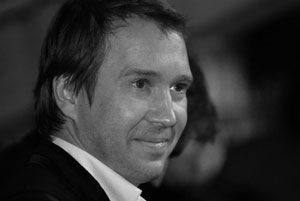|

Yevgeny Mironov (biography)
26 May
Opening of the XX Music Festial Stars of the White Nights
| |
Do you find it easier or, perhaps, more interesting to play the “greatest villain,” a normal man or the “positively wonderful” hero?
You know, there is no such thing as the “greatest villain” or the “positively wonderful” hero. There are characters, heroes, that are amalgamations of all things.
Perhaps because in literature there are so few “positively wonderful” heroes?
Yes, because in real life they don’t exist. That is why Dostoevsky struggled so much. Before writing the character of Myshkin, he studied the international phenomenon of wonderful heroes and came to the conclusion that essentially there was only Jesus Christ – as a historic figure – and Don Quixote, whom, apropos, Cervantes wrote with great humour...
But there’s also Mr Pickwick, or the Bishop of Digne in Hugo’s Les Misérables...
They are not “positively wonderful” heroes in the true sense of the phrase. In the pure sense it’s not just very difficult – it’s impossible. And, for me, Myshkin is not really a man in any case. He has such a range of qualities without any defects, without complexes, and that seems rather distilled...
A Russian Christ?
Yes, you could say that.
Do you agree with the view that an actor can and should act as a censor for the director?
Absolutely. Normally they say that an actor is the advocate for his role. But he is also, of course, the prosecutor. If he doesn’t examine his character from the sidelines, critically, he will be unable to see those qualities he would wish to protect. That’s how it is – there are two sides.
When you perform, do you empathise with your character and do you let him get inside you? How do you tackle the process of bringing a character to life?
You’re asking questions that have no short answers... Bringing a character to life is a very complex process. In actual fact, at rehearsals I study the character in full, on a genetic level, and later when I am performing the role I am no longer looking on from outside, as they say, but I am completely “under the skin” of that character. And the audience should be able to feel anything that happens to me.
Acting is, in that sense, a display of emotions, a dissecting of actions and incentives. Don’t you think that digging deep into the baseness of humanity in order to understand a character can poison the soul?
No, I don’t think that, because all of Dostoevsky is founded on just that. And, when you get to the lowest depths and understand every human weakness it’s the reverse – you become elevated. You understand where you can go after this “purgatory.”
You appeared in the film Metamorphosis after the novella by Kafka. What was it like, “taking off” the role of an insect?
It was, after all, a film. We completed it in about six weeks, and I don’t remember ever needing to “get out.” I remember it was very interesting, in particular thanks to the directing by Valery Fokin.
Have you ever met people whose professionalism and personal qualities have suddenly and fundamentally altered something in your life, or, perhaps, influenced your view of the world?
Yes, of course. One such person I had the good fortune to meet was Solzhenitsyn. And both my view of the world and my inner self changed...
Pelevin used one of his literary characters to say that “Possibly because of the fact that my whole life I have been trying on various masks I have never valued anything as much as I have sincerity.” Do those words apply to you as an actor and as a man?
Yes, of course.
Because you have to distance yourself from human curiosity or because of the masks that you have to try on?
No. It’s just that for me sincerity is like lacmus paper. Both in life and in art. But if we’re speaking about characters, then discovering truth and honesty in them is probably a way to find the sincerity that exists in all of us.
Speaking with Svetlana Nikitina
|
